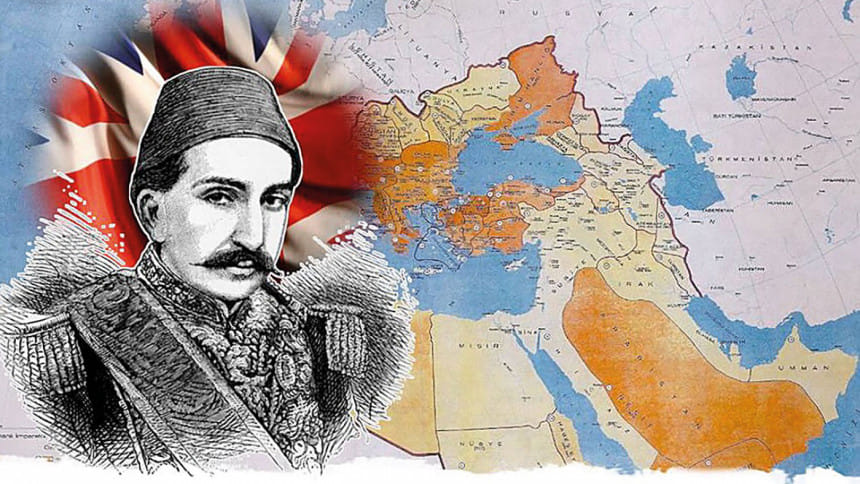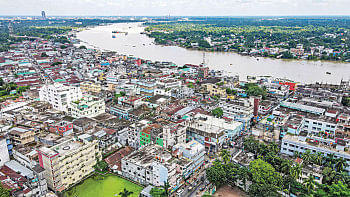Sultan Abdul Hamid II: ‘The Unspeakable Turk’ Fights Back (Part II)

Sultan Abdul Hamid's ties to the Indian sub-continent are a revelation for those more accustomed to seeing the name of Mustafa Kemal Ataturk on main thoroughfares or commemorative stamps. Our knowledge of the Ottomans is usually through the lens of our British authored, Euro-centric textbooks. While French, Czarist Russia and Austro-Hungarian Empires merit their own chapters, Ottoman Turkey is lumped with the Balkans under "the Eastern Question." In our own political history, engagement with the Ottomans is restricted to a paragraph or two on the Khilafat Movement of Fez-wearing Indian Muslims. Supported by Gandhi and the Congress Party, they had jointly protested the harsh treatment of Turkey after its defeat in the First World War, demanding the restoration of the Caliphate. Even after the Turkish monarchy was formally abolished by Kemal Ataturk, the ties between the Nizam of Hyderabad remained close enough for the daughter of the deposed Abdul Majid, (effectively the last 'Caliph') to have married Prince Azam Jah, his son and heir in 1930.
In the TV series, a grateful Abdul Hamid II is seen receiving chests of gold and other valuables sent by Indian Muslims to aid the cash-strapped Sultan in financing his pet
Railway project. In one episode, the possession of a notebook, containing the names of all his Indian donors is the cause of much bloodletting by his enemies, desperate to hand these names over to British intelligence. Similarly in Islamic history, we find few references to Sultan Abdul Hamid — a curious omission since the Ottoman Sultan was also the Caliph or Prince of the Faithful. He had wrested this title from the last Abbasid Caliph when the Ottomans conquered Arabia in 1517. Palestine, the Hejaz, Syria, Mesopotamia, Lebanon, Libya, Egypt, Tunisia, Algeria were all under Ottoman suzerainty and they controlled the three Holy places, Makkah, Medina and Jerusalem.
In the light of recent events in the Middle East, the fall of Abdul Hamid and the consequences of his dethronement in 1908 are of utmost significance. It is now widely accepted that the wilful dismemberment of the Ottoman empire after World War I triggeredby the 'Arab Revolt' of 2016, a British financed and armed operation, (glamorised and sanitised in the epic film, 'Lawrence of Arabia') is a crucial turning point in world history. The subsequent occupation and partitioning of former Ottoman lands by Britain, France (and even Italy who grabbed Libya in 1912) is the crucible of the Middle East conflict and the current refugee crisis in Europe.
History is full of if and buts and admittedly hindsight has a great vantage point, but it is fair to surmise that if Sultan Abdul Hamid been in office when World War I broke out, it is unlikely that the Sharif Husain of Makkah or his sons could be persuaded by the British to revolt against their Sultan and Caliph. Unlike the secular, hyper nationalist triumvirate of Pashas who ousted him, the conservative, Zikr-chanting Abdul Hamid was a Pan-Islamist, who saw religion as the glue that held his Muslim subjects together. Arabs had held high positions in the army and his administration. Abdul Hamid had also been instrumental in backing Husain as Sharif of Makkah, against the wishes of the Pashas. "I pray that God may punish those who have prevented me from benefitting from your talents," he told Husain before sending him to Makkah. Husain repaid the favour by assisting Abdul Hamid in the failed counter revolution in 1909, offering him a base and sanctuary in Makkah, an invitation the Sultan declined and would live to rue.
When the War reached a bloody stalemate in Europe, and following an unnerving defeat of the Allies in Gallipoli by the Turks, the Arabian theatre was activated. To prevent Turkish troops poised from attacking a vital artery, the Suez Canal, Arabs of the Hejaz were armed and financed to rebel against and harass the Turks in a bloody guerrilla style campaign. In his celebrated book Seven Pillars of Wisdom, Colonel T.E. Lawrence, the British agent who accompanied the fearsome Chieftain Auda Abu Tayi in the taking of the Port of Aqaba, describes one gruesome incident when "three hundred Turkish soldiers were killed in a few minutes."
And in return for this callous bloodletting? Sharif Hussain was given "assurances" he would be King of a unified Arab Kingdom from Palestine to the Persian Gulf; Simultaneously but secretly, Zionists in London were pledged the same piece of real estate for their own "Promised Land." And in a masterly stroke of double and triple cross, there would be a two - way division of the spoils: imperialist mandates in Palestine and Mesopotamia, for Britain, Syria and Lebanon for France, both areas intricately mapped as A and B in the infamous "Sykes – Picot" agreement. And what would become of Turkey? The third wartime ally, Tsarist Russia was to have a prize cherry, the city of Constantinople, satisfying her long coveted ambition of a passage to the Mediterranean Sea. Fortunately, Russia's new Marxist rulers withdrew from the War and refused to partake in this imperial plunder.
Another revealing exposition of the war aims for the Ottoman territories is this letter by Mark Sykes to his friend Aubrey Herbert, an intelligence officer in the Cairo Bureau: "I perceive by your letter that you are Pro-Turk still...your policy is wrong. Turkey must cease to be. Smyrna (present day Izmir) shall be Greek. Adalia Italian. Southern Taurus and North Syria, French, Filistin (Palestine) British, Mesopotamia British and everything else Russian. And Noel Buxton and I shall sing a 'Te Deum' in St. Sophia and a 'Nunc Dimittos' in the Mosque of Omar. We will sing it in Welsh, Polish, Celtic and Armenian in honour of all the gallant little nations...stir up mischief in Syria and you will get Germans massacred and the Turks ousted… keep worrying...never leave orientals alone too long. If you don't feel like fighting them, send money and cartridges— never give the Turks a moment of peace."
The desire for Crusader retribution and the singing of celebratory hymns aside, it was the discovery of vast petroleum deposits, that tipped the scales first against Sultan Abdul Hamid, and later, his successors the Young Turks, who, despite their reforms and Liberal outlook were seen as "atheists and radicals who tried to ape the West without truly understanding it and who continued all the inbred oriental vices of intrigue, treachery and violence." The post-war betrayal of Arab hopes and the arbitrary and callous manner in which Ottoman territory was delineated into fractured nation-states, Israel/ Palestine, Jordan, Syria, Lebanon, Iraq and Saudi Arabia suited entirely the commercial, strategic and geo-political interests of the Allies, with scant regard for religious sensibilities orethnic fault lines.As a contemporary observed " Iraq was created by Churchill who had the mad idea of joining two widely separated oil wells, Kirkuk and Mosul byuniting three widely separated people, the Kurds, the Shias and the Sunnis.'' A hundred years laters the aftershocks are being felt every day.
Mustafa Kemal Pasha is rightly revered as the founder of modern Turkey. After the Allies had occupied Constantinople, he prevented Turkey from being wiped off the map of Europe by organising a military fight back. Having secured its territorial integrity he then put Turkey on the path of modernisation and progress. But let's spare a thought for the much-maligned Sultan Abdul Hamid II. Like that other so - called historical "villain," the Mughal Emperor Aurangzeb, he merits a re-appraisal. If "bloody" Czar Nicholas II can be been elevated to Sainthood by the Orthodox Russian Church, the "Unspeakable Turk" needs rehabilitation too. A road or building named after him might be a good idea in historical restitution.
Ghazala Akbar was once the Feature Editor of The Arab Times, Kuwait. Now-a-days she lives in London.

 For all latest news, follow The Daily Star's Google News channel.
For all latest news, follow The Daily Star's Google News channel. 



Comments